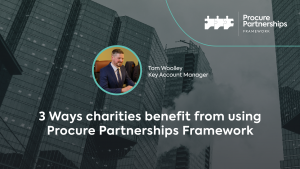Here Procure Partnerships Framework Director, Robbie Blackhurst, discusses some of the challenges involved in public procurement, and how, by focusing on people as well as places, frameworks can play an increasingly supportive role in helping projects to be delivered on time and on budget.
Decreasing budgets and funding gaps
We’re all aware that across the public sector, organisations and institutions are dealing with ever tightening budgets. But with school places and housing shortages dominating the headlines, the pressure on public sector bodies to keep delivering high-quality construction projects continues to grow. The public sector accounts for 40% of all UK construction spending and for it to be sustained, we need to see a change in how procurement frameworks operate, and how client and contractors can better collaborate.
Cost is always a vital consideration for any capital project but in the public sector, there is an even greater need for frameworks to guarantee value for money for clients. High framework fees are taking away funds that should be directly invested into the project, meaning that in the end, we all lose out if compromises are made to buildings that we, or our families, could end up using. As well as not charging clients to use them, frameworks could make funds available which public sector bodies can apply for to support funding gaps and get projects off the ground. When budgets are tight, the added financial support of a well-structured framework could help deliver feasibility works.
Avoiding risk through better reporting
Far too often in the mini competition procurement process, contractors are appointed and them and the client are then left to ‘get on with it’. Frameworks can play a positive role in supporting clients and contractors actively deliver their projects and should not be a simply a procurement list. Greater emphasis is needed on closer, more frequent reporting and monitoring, tackling any supplier related challenges before, during and after the mini competition procurement stage to ensure cost and time predictability is delivered on each and every project.
The technology is there to provide detailed electronic reporting, so it’s surprising that this isn’t happening more. As well as allowing all levels of public sector bodies to feel better connected to their projects and its progress, monthly reporting is also valuable to contractors who will benefit from a regular audit trail shared with the framework who can act as a third party mediator.
With school buildings and hospitals at stake, the public sector needs a procurement process that mitigates risk as much as possible. After all, what will happen if that new high school isn’t ready for pupils in September? Or a new hospital department does not delivery the clinical function. Ultimately, monthly reporting will help clients and contractors to avoid unforeseen obstacles and implement risk mitigation procedures.
A commitment to places and people
Of course, the benefits above can assist the successful delivery of building projects, but in public procurement, we need to focus on the people involved too, not just places, as has long been the case.
As well as addressing the short-term issues, frameworks also have the opportunity to drive long-term change and transform public sector construction. One of the single biggest issues facing the sector today is of course the skills shortage crisis, and there is a need for contractors and the frameworks which they operate across to accept a greater responsibility in supporting construction skills training.
Also, by directly supporting and funding training, frameworks themselves can open up more apprenticeships and courses to young people, helping to protect the future of the construction industry and creating more opportunities to better our towns and cities in the longer term.
It’s time that the procurement challenges that have hindered public sector construction for decades were addressed, allowing more projects that improve our communities, and the lives of the people within them, to be unlocked.

Robbie Blackhurst is the Founder and Director of Black Capital Group, the holding company that powers Advance Social Value, Compliance Chain, Procure Partnerships Framework and Strategic Resourcing. Robbie is a member of the Chartered Institute of Builders, is MCIPS certified and has an undergraduate degree in Aviation and Aerospace, a postgraduate degree in Construction Project Management, and a Master’s in Business (MBA).



